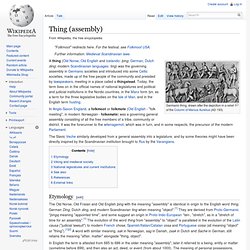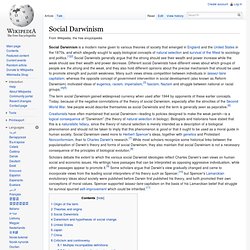

Thing (assembly) A thing (Old Norse, Old English and Icelandic: þing; German, Dutch ding; modern Scandinavian languages: ting) was the governing assembly in Germanic societies and introduced into some Celtic societies, made up of the free people of the community and presided by lawspeakers, meeting in a place called a thingstead.

Today, the term lives on in the official names of national legislatures and political and judicial institutions in the Nordic countries, in the Manx form tyn, as a term for the three legislative bodies on the Isle of Man, and in the English term husting. In Anglo-Saxon England, a folkmoot or folkmote (Old English - "folk meeting", in modern Norwegian - folkemøte) was a governing general assembly consisting of all the free members of a tribe, community or district.
It was the forerunner to the witenagemot, which was in turn, and in some respects, the precursor of the modern Parliament. Social Darwinism. Social Darwinism is a modern name given to various theories of society that emerged in England and the United States in the 1870s, and which allegedly sought to apply biological concepts of natural selection and survival of the fittest to sociology and politics.[1][2] Social Darwinists generally argue that the strong should see their wealth and power increase while the weak should see their wealth and power decrease.

Different social Darwinists have different views about which groups of people are the strong and the weak, and they also hold different opinions about the precise mechanism that should be used to promote strength and punish weakness. Many such views stress competition between individuals in laissez-faire capitalism; whereas the opposite concept of government intervention in social development (also known as Reform Darwinism) motivated ideas of eugenics, racism, imperialism,[3] fascism, Nazism and struggle between national or racial groups.[4][5] Origin of the term[edit] Anarchism. The central tendency of anarchism as a social movement has been represented by anarcho-communism and anarcho-syndicalism, with individualist anarchism being primarily a literary phenomenon[25] which nevertheless did have an impact on the bigger currents[26] and individualists have also participated in large anarchist organisations.[27][28] Many anarchists oppose all forms of aggression, supporting self-defense or non-violence (anarcho-pacifism),[29][30] while others have supported the use of some coercive measures, including violent revolution and propaganda of the deed, on the path to an anarchist society.[31] Etymology and terminology[edit] The term anarchism is a compound word composed from the word anarchy and the suffix -ism,[32] themselves derived respectively from the Greek ἀναρχία, i.e. anarchy[33][34][35] (from ἄναρχος, anarchos, meaning "one without rulers";[36] from the privative prefix ἀν- (an-, i.e.
"without") + ἀρχός, archos, i.e. History[edit] Origins[edit]